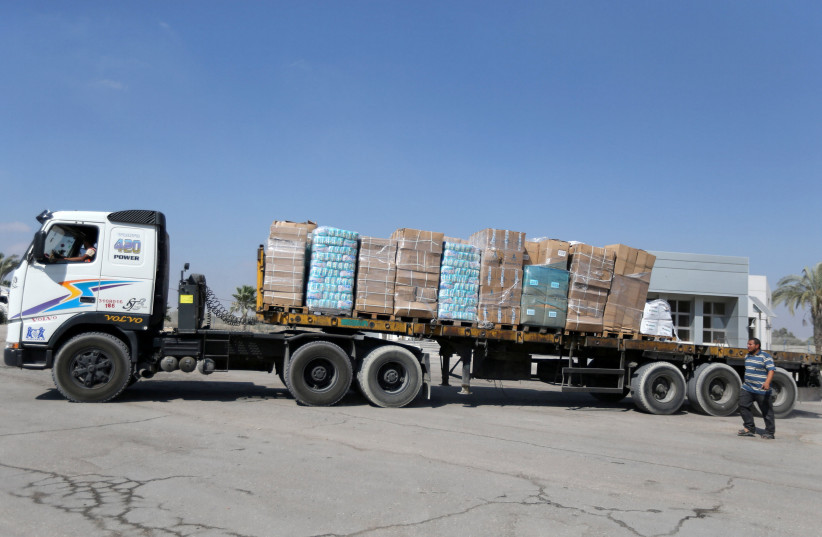Defense Minister Yoav Gallant was just as opposed to intervention in Gaza by the Palestinian Authority as was Prime Minister Benjamin Netanyahu, including with regard to the delivery of humanitarian aid.
From November through January, Gallant repeatedly emphasized, in public and in private, that the PA was categorically part of the problem and could not be part of the solution.
This has radically changed. Gallant, The Jerusalem Post understands, has now united with National Unity Party leader Benny Gantz and the IDF to support having around 7,000 Palestinian Authority/Fatah-affiliated Gazans form a new police force to supervise the delivery of humanitarian aid.
Gallant had hoped, along with the Shin Bet and the IDF, that local clans would be able to take over management of Gaza from Hamas.
Serious attempts were made to facilitate such a solution for months. The Post understands that these attempts failed miserably.

Part of the problem is that clan leaders have been assassinated by Hamas, freezing any possibility of cooperation with Israel – or even with the international community – in any area Hamas opposes.
Even if Hamas hadn’t carried out those assassinations, the number of truly independent clans is minuscule, with almost everyone being affiliated with either Hamas or Fatah. Only as part of a larger group – in this case, Fatah – could a new force for securing aid potentially survive Hamas’s ferocious attacks.
As badly as Israel wants to get Hamas out of the business of controlling food distribution, the terror group wants that control even more.
For Israel, taking away Hamas’s control of food distribution in Gaza is a strategic necessity to enable the eventual, full toppling of the terrorist group and prevent it from retaking control later on.
For Hamas, remaining in control of food distribution is a matter of survival as an organization; there is no risk too big for it to take and no one too important to kill to maintain that monopoly.
Hamas is more afraid of Israel giving Fatah control of food deliveries than it is of the entire Israeli air force, tank, and artillery corps, sources say.
All Hamas needs to do going forward is prevent or slow down attempts to deliver food without its involvement. This can lead to additional global alarms of famine, and Israel will have “lost,” even if it succeeds tactically.
Sources say Israel must succeed at getting food to Palestinians in sufficient volume so that the “famine” warnings disappear; otherwise, it “loses,” even if it is “winning” tactically.
For example, the IDF moved many trucks through Gaza without Hamas intervention. However, three incidents where there were interventions led to many casualties and deaths among Palestinians, for whom the aid was earmarked. This convinced much of the world that the IDF could not handle the job.
They say, “If the IDF’s ‘success’ leads to Palestinian deaths, we do not care if Hamas is the cause; it’s not working.”
Another part of the plan is to eventually close all of the crossings between Israel and Gaza, completely cutting the umbilical cord between the two, such that Gaza eventually receives aid or trade exclusively either through Egypt at Rafah or through
maritime channels, where Israel will inspect deliveries before they arrive.
GALLANT BELIEVES that during the last two months, Gaza has fallen into chaos in areas where the IDF achieved operational control because Netanyahu is more afraid of attacks from political rivals – Finance Minister Bezalel Smotrich (Religious Zionist Party) and National Security Minister Itamar Ben-Gvir (Otzma Yehudit) – than he is of the chaos and consequential global criticism, according to sources.
They add that Gallant is convinced that, absent a shift toward looping in Fatah, Israel will end up stuck running Gaza.
He is also convinced, due to heightened criticism from the US and EU allies, that other than Fatah stepping up to police the aid, the only remaining alternative is for Israel to do it, which, he believes, would lead to more disaster.
Although Gantz has been careful not to be too supportive of the PA or Fatah out loud, it has been well known for years that he has tried to boost the PA, including by holding meetings with PA President Mahmoud Abbas when he was defense minister.
The IDF was never particularly opposed to the PA in the first place but has been open to local Gazans taking over from Hamas if it was achievable. Given that the military also believes this plan failed, sources say, it is pushing hard behind the scenes for Fatah to handle the aid.
This leaves Gallant, Gantz, and the IDF in a new alliance – against Netanyahu in the war cabinet.
The Post understands that this gulf on a major policy issue did not just develop this week but has been simmering for several weeks and is now closer to breaking out into a verbal battle.
Sources add that by delaying Fatah’s involvement, Netanyahu is giving up a major card that Israel could be using to pressure Hamas in hostage negotiations as well as to gain more slack from the US and EU regarding day-after plans, along with Rafah.
Gallant's shifting support?
It even appears that Gallant may be moving, along with Gantz and the IDF, toward supporting a reformed PA to run aspects of the internal management of Gaza, even if he continues to oppose giving the PA formal statehood. This opposition is important to Gallant because it gives the IDF the freedom to continue to act as needed within the enclave to prevent terror, along with a border security corridor post-Oct. 7.
This significant shift by Gallant, and to some extent by the IDF, toward Gantz on this issue and away from Netanyahu could be decisive in shaping Gaza’s future.
A spokesperson for the prime minister had not responded at press time regarding this narrative or regarding how he thought Israel could find a third party that isn’t Fatah to manage security aid and Gaza.
